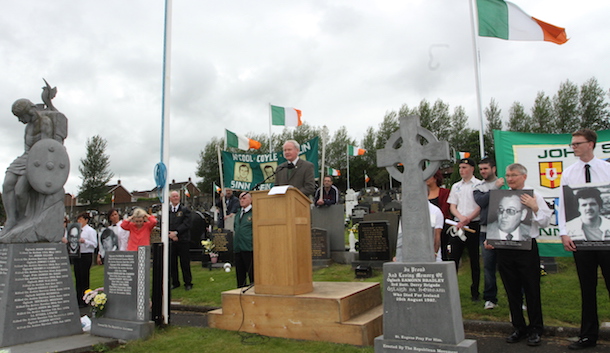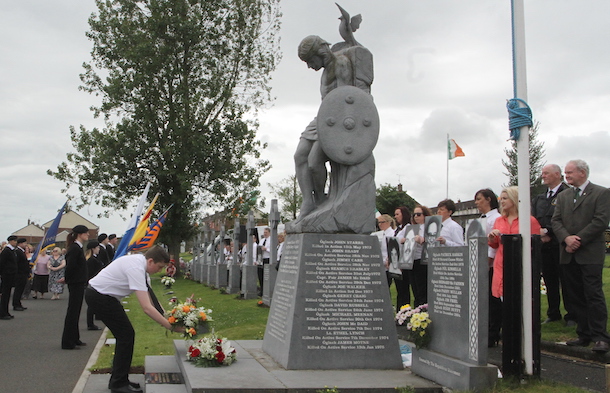28 June 2015
Peace Process moves must be reciprocated by political unionism and by British state, Martin McGuinness tells Derry Volunteers Commemoration

MARTIN McGUINNESS has paid tribute at the annual Derry Volunteers Commemoration to the sacrifices of IRA Volunteers and their families. He declared that the challenge now for everyone involved in the Peace Process – including the British Government – is to ensure that there can never be a repeat of what went before.
“That will require leadership and courage on all sides, and I firmly believe that republicans have been and are willing to show that leadership.
“Reaching out the hand of friendship, taking initiatives and working together in a spirit of generosity doesn’t mean surrendering our principles or our political allegiances.
“The flags flying above this graveyard are orange as well as green. Seeking unity among our people is at the core of our Irish republicanism and has been since it was first articulated by Theobald Wolfe Tone.
“Reconciliation, respect and accommodation – these are the right things to do. It is the republican thing to do.
“But if this process is to be successful it cannot be a one-way street. To be successful it must be reciprocated by political unionism and by the British state.
“There can be no hierarchy of victims, just as there is no single or agreed narrative of the conflict. Everyone involved needs to be addressed and dealt with on the basis of equality and parity of treatment.”
During the Stormont House negotiations, the Sinn Féin deputy First Minister said, the British Government publicly acknowledged their role in creating and sustaining the conflict – “and their responsibility in terms of addressing the legacy of it”. He said that was a small step but a necessary one and one that needs to be built on.
“Unionist political leaders also need to recognise their responsibilities and the enormously damaging role that the sectarian structure of this state played in generating decades of conflict.”
This is the full text of Martin McGuinness’s speech
“I am honoured to give the main address today and heartened to see so many here to pay tribute to our patriot dead.
“In particular, I welcome the Volunteers’ families and – on behalf of Sinn Féin – would like to express our ongoing solidarity and support for you all.
“This year marks the 30th anniversary of the death of Charles English, the 40th anniversary of Jim Moyne and the 45th anniversary of Tommy McCool, Joe Coyle and Thomas Carlin, who died in a tragic explosion, which also claimed the lives of Tommy McCool’s young daughters, Bernadette and Carol.
“We remember them all with a heavy heart but also a determination to continue to work tirelessly to build the kind of Ireland, which they – and generations of republicans before them – dreamed of.
“A free Ireland. a just Ireland, an Ireland where all are cherished equally, regardless of creed, colour or class – an Ireland that respects all of the traditions on this island and where our differences are celebrated not feared.
“We have come a long way along that road. Derry is now a very different place. Ireland is a very different place – a better place – but there is still some way to travel.
“Irish republicans have been at the centre of that process of change. Initiatives taken by the leadership of the Irish Republican Army created the space to break the cycle of repression, resistance and conflict and to explore and construct, for the first time in the history of this state, peaceful and democratic options for tackling injustice and delivering essential change.
“As a result, there is now a political way forward. Thankfully, the gun has been taken out of Irish politics.
“However, the bitter divisions of the past continue to dominate politics in this part of Ireland and that is why reconciliation must become the next phase of the Peace Process and our contribution, as Irish republicans, must be to embrace and build that process of healing and accommodation.
“The past cannot be changed or undone. Neither can the suffering, the hurt or the violence of the conflict, be disowned by republicans or any other party to the conflict.
“Therefore, the challenge for all of us involved in the Peace Process – including the British Government – is to ensure that there can never be a repeat of what went before.
“That will require leadership and courage on all sides and I firmly believe that republicans have been and are willing to show that leadership.
“Reaching out the hand of friendship, taking initiatives and working together in a spirit of generosity doesn’t mean surrendering our principles or our political allegiances.
“The flags flying above this graveyard are orange as well as green. Seeking unity among our people is at the core of our Irish republicanism and has been since it was first articulated by Theobald Wolfe Tone.
“Reconciliation, respect and accommodation – these are the right things to do. It is the republican thing to do.
“But if this process is to be successful it cannot be a one-way street. To be successful it must be reciprocated by political unionism and by the British state.
“There can be no hierarchy of victims, just as there is no single or agreed narrative of the conflict. Everyone involved needs to be addressed and dealt with on the basis of equality and parity of treatment.
“There needs to be an acceptance that human beings cry, die, bleed and grieve and are mourned in the same way, and that our common humanity should acknowledge that.
“Our history is a contested space. It probably always will be. But that doesn’t mean that our future must be also.
“During the Stormont House negotiations, the British Government publicly acknowledged their role in creating and sustaining the conflict – and their responsibility in terms of addressing the legacy of it.
“It’s a small step but a necessary one and one that needs to be built on.
“Unionist political leaders also need to recognise their responsibilities and the enormously damaging role that the sectarian structure of this state played in generating decades of conflict.
“The leadership of unionism has been slow to do so. In many ways they cling to a past that no longer exists – and in so doing encourage others to do the same.
“The triumphalist demands of the Orange Order in north Belfast are one of the consequences of this failure of leadership. Rather than encouraging intransigence, unionist parties should demonstrate the leadership, dialogue and mutual respect that delivered the now peaceful Apprentice Boys demonstration in this city every August.
“And I do believe that many within the unionist community support that approach. They want to put the failures of the past behind us and to build a shared future based on accommodation, inclusivity and mutual respect.
“I do believe that our society is moving forward, slowly but steadily, and we need to continue that process.
“And it is our duty to continue to demonstrate to unionists – our fellow countrymen and women – that they have nothing to fear from Irish republicans, and nothing to fear equality, and nothing to fear from reconciliation and unity on this island.
“Building a united Irish republic which cherishes all of the children of the nation equally is the only fitting tribute we can pay to those we remember here today.”
Follow us on Facebook
An Phoblacht on Twitter
Uncomfortable Conversations

An initiative for dialogue
for reconciliation
— — — — — — —
Contributions from key figures in the churches, academia and wider civic society as well as senior republican figures





